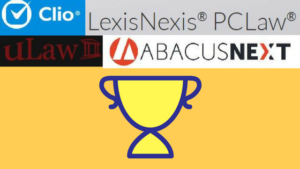Spot audits in law practice are more or less like the practice inspection in accounting practice. The Law Society has expressed concerns over financial deficiencies noted during the spot audit. In some cases, poor documentation and records may lead to practice suspension by The Law Society. What the Law Society is looking for is the updated books and records as well as customized reports. Generally, trust accounts and detailed general ledger are two key areas that attract attentions from auditors.So, how legal professionals handle a spot audit then?
Firstly, choose a good accounting software that fits your practice.There are a number of options in the market for law practice. Here I introduce a few to you:
uLaw Practice is quite popular for a lot of one or two lawyers practice,even for many paralegals.It provides Trust & General accounting over the cloud. Like many accounting software, it claims to focus on your practice and manage while it handles your invoices and accounting. You gotta say uLaw has rich accounting features. For example, it removes the complexity of trust accounting and the process is easy as clicking a button.The price range is around $400 per year per subscription.
PCLaw is another software used by law firms and created by LexisNexis.It provides trust accounting, client management, case and matter management, track billable hours, capture expenses, and manage billing and accounting in a larger scale. Even it goes further to provide visual analysis. The price range is around 1k per one fee earner.
AbacusLaw is another solution of legal professionals. It focuses on case management and simplify the processes in case management, time, billing, and account operations – while growing your firm. In terms of accounting features, you can add Quickbooks as an additional application. If you are happy with QuickBooks, AbacusLaw provides Cloud server option to be compatible with Quickbooks. Definitely if you pay a bit more, you can upgrade to AbacusLaw Gold to integrate time, billing and accounting functionality.
Similarly, you may find Clio is a good fit for your practice management needs as well. It is a cloud-based legal practice software. Clio integrates with the most popular accounting software used by law firms—Quickbooks and Xero.
So, what’s your best option? Depends on your needs, if for a small law practice, uLaw has the best value in terms of price tag as it combines the practice management and basic accounting functions. It pretty much handles everything in your practice from accounting perspective.
Secondly, you need to have accounting professional with deep knowledge in legal practice to process accounting data ensure requirements of books and trust accounts are met.
- We know that there is no enough resources to have a huge accounting team to support sole practitioners and lawyers in small law firms. But being proactive in your financial activities is always critical. Here are some suggestions to help you prepare before the spot audit:
- Are your trust receipts and disbursements always up to date?
- Do you need to maintain different types of trust bank accounts?
- Do you ensure that the trust comparison, which compares the reconciliation of the trust bank account and the client trust listing, is prepared within 25 days of each month end?
- Reconciling items in the trust account are listed individually and each one is clearly explained and can be traced to the bank statement?
- The deposit book confirms any outstanding deposits listed on the trust bank reconciliation were deposited (the next banking day)?
- Uncashed cheques that are outstanding for more than two months are followed up?
- Are there overdrawn client trust ledger accounts?
- Funds in trust for completed matters have been billed to the proper clients, and the funds either transferred to your general account or returned to the client as appropriate?
- Have you followed up on all client trust ledger account balances that have had no activity in the past twelve months?
- Do you periodically check the clients’ trust ledger looking for unusual or incorrect items?
- Are all transfers of funds between client trust ledger accounts recorded in a trust transfer journal as required by section 18(4) of By-Law 9?
- Have you given a written direction to your financial institution to pay all interest on your mixed trust account directly to The Law Foundation of Ontario as required by section 57.1 of the Law Society Act?
- If you make ABM deposits, do you always print out the ABM deposit receipts, attach them to your deposit book, and record the details of the deposit (i.e. source of funds, client reference and amount) in your deposit book?
- Are credit card and debit card receipts from clients paying your invoices always deposited directly to your general account and the details recorded in your general deposit book?
Thirdly,if you can not handle the stress in the audit process, let professionals handle them for you. Focus on your expertise.
If you have the accounting challenges in your spot audit law practice, don’t hesitate to give us a call or drop us a line. We surely can help!

Recent Comments